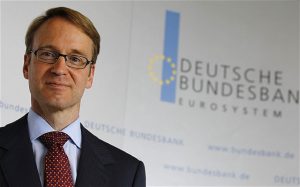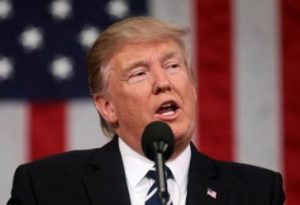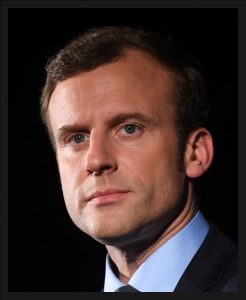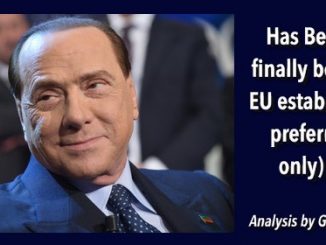
The Perfect Storm for 2020: Weidmann at the ECB, Trump’s trade war, Macron’s failure, Italy’s turmoil
GEFIRA
Clouds are gathering: Weidmann will end QE while Macron’s reform will not solve any problem whatsoever. It’ll be the final push for a Eurosceptic Italy, where plans for parallel currencies are popping up. Add Trump’s trade war to the soup and 2020 promises to turn nasty.
It is becoming increasingly clear that at the end of 2019 Jens Weidmann, current President of the Bundesbank, will replace Mario Draghi at the helm of the European Central Bank. The change in terms of economic beliefs will be radical and, combined with the other developing issues in Italy and the US, which will be discussed later in the text, might as well put an end to the misery of the Eurozone.
What does Jens Weidmann believe in?
As a typical post-Weimar German, he believes in strong currency and low inflation. The Financial Times carried an interesting interview with him a few weeks ago,1) in which the German financier  expressed his opposition to everything that Mario Draghi has stood for in the last few years and made known his wish to stop the quantitative easing program and replace it with raised interest rates. What happens when interest rates increase? If they go up too fast, markets crumble. Low interest rates offered for too long have contributed to the subprime mortgages debacle of 2007-8. In 2012, at the peak of the Eurozone sovereign debt crisis, Draghi promised to do ”whatever it takes” to preserve the European common currency. Weidmann was the only one on the board of the ECB who was opposed to this, too. Draghi’s statement had a therapeutic effect on financial markets which quickly calmed down after it. Once he’s gone, however, Weidmann is unlikely to show the same resolve to indeed do whatever it might take to keep the currency together. Finally, just like most Germans, he is not a fan of Emmanuel Macron’s idea of creating a Eurozone budget because the money transfer is seen as too much of a concession towards “lazy Southerners”. Maybe in the end Weidmann will opt to preserve the status-quo, but if he sticks to his beliefs, rates will increase, markets will fall and it’ll be the end of the Eurozone.
expressed his opposition to everything that Mario Draghi has stood for in the last few years and made known his wish to stop the quantitative easing program and replace it with raised interest rates. What happens when interest rates increase? If they go up too fast, markets crumble. Low interest rates offered for too long have contributed to the subprime mortgages debacle of 2007-8. In 2012, at the peak of the Eurozone sovereign debt crisis, Draghi promised to do ”whatever it takes” to preserve the European common currency. Weidmann was the only one on the board of the ECB who was opposed to this, too. Draghi’s statement had a therapeutic effect on financial markets which quickly calmed down after it. Once he’s gone, however, Weidmann is unlikely to show the same resolve to indeed do whatever it might take to keep the currency together. Finally, just like most Germans, he is not a fan of Emmanuel Macron’s idea of creating a Eurozone budget because the money transfer is seen as too much of a concession towards “lazy Southerners”. Maybe in the end Weidmann will opt to preserve the status-quo, but if he sticks to his beliefs, rates will increase, markets will fall and it’ll be the end of the Eurozone.
Trump is winning, Macron is not
The financial press ridicules the American President and regards his French counterpart as a godsend. Yet, when you look at their hitherto policies, they have been rather similar: less taxation,  especially for the rich and restricted immigration. If you look at the results, both economies are experiencing solid growth. Still, it is Macron who is credited for “creating confidence among businesses for his reforms” while Trump’s success is framed as a fluke at best. It might well be, but the US economic growth is stronger than France’s and the US stock market boom (which began on the night of November 8th 2016 when it became certain that Donald Trump had defeated Hillary Clinton and the market reversed galloping all the way throughout 2017) is a driving factor globally. So, if Mr. Market’s behaviour means anything, then Trump can partly claim credit, Macron can’t.
especially for the rich and restricted immigration. If you look at the results, both economies are experiencing solid growth. Still, it is Macron who is credited for “creating confidence among businesses for his reforms” while Trump’s success is framed as a fluke at best. It might well be, but the US economic growth is stronger than France’s and the US stock market boom (which began on the night of November 8th 2016 when it became certain that Donald Trump had defeated Hillary Clinton and the market reversed galloping all the way throughout 2017) is a driving factor globally. So, if Mr. Market’s behaviour means anything, then Trump can partly claim credit, Macron can’t.
The balance of real strength between Trump and Macron couldn’t have been made clearer. A few days ago Trump signed his tariffs on steel and aluminium into law, and when Macron called him on the matter, it was to no avail.2) The latter also called on the WTO to intervene, but the  motivation adduced by Trump is “national security” and there is little the WTO or Macron can do about it. It’s game, set and match for the American president.3) Even if the roles had been reversed, the mainstream press would be still praising Macron and mocking Trump. As it is, the French president’s debacle has been rather ignored.
motivation adduced by Trump is “national security” and there is little the WTO or Macron can do about it. It’s game, set and match for the American president.3) Even if the roles had been reversed, the mainstream press would be still praising Macron and mocking Trump. As it is, the French president’s debacle has been rather ignored.
The massive German trade surplus has often been named as a factor of instability on the international stage. Still, the European Commission, the IMF, former US presidents and the rest of the EU members have failed to lessen it so far. Trump is going to do what everyone else did not have the courage to: punish Germany. He will wage a trade and currency war against the Eurozone, and the above-mentioned tariffs are just the first act.
Finally, consider what will become of Macron’s reform of the Eurozone and its budget. The latter according to journalist Wolfgang Munchau, who’s generally well informed on the topic, will be a grand total of €3 billion a year, roughly 0.03% of the Eurozone GDP,4) so its contribution to the effort to rescue the losing members of the European common currency from their fate is negligible. Even if Macron has the finance minister of his own choosing and the budget he is calling for, it won’t help.
Emmanuel Macron might have “all the right ideas” as the mainstream media love to say, but he’s also not delivering on them and there are doubts he ever will, while the media – covering for him come what may – keep digging the grave for their own credibility.
The Italian revolt
Since the last election, Italy is officially a Eurosceptic country. Mainstream parties committed to the European integration project have been vanquished. It is hard to predict if the country is going to have a government. The 5 Star Movement won the most seats but lacks the majority. The Democratic Party is imploding: the base wants to support a M5S government because “that’s where our voters went”, but the likely future leadership under the former development minister  Carlo Calenda has no intention of doing so. Lega has the strongest coalition, but also lacks the numbers and so far has been waiting on the sidelines. Its leader Salvini (pictured) knows that in case a new election is held, he is likely to finish off his ally Berlusconi by taking even more votes from him. He also knows that if M5S makes a deal with the establishment, they’ll lose votes to him, making him the only credible candidate for change. He’s in no hurry. Mario Draghi will only become available for the position of prime minister in 2019. M5S might actually end up picking him, but supporting a technocratic government would be the end of the protest movement.
Carlo Calenda has no intention of doing so. Lega has the strongest coalition, but also lacks the numbers and so far has been waiting on the sidelines. Its leader Salvini (pictured) knows that in case a new election is held, he is likely to finish off his ally Berlusconi by taking even more votes from him. He also knows that if M5S makes a deal with the establishment, they’ll lose votes to him, making him the only credible candidate for change. He’s in no hurry. Mario Draghi will only become available for the position of prime minister in 2019. M5S might actually end up picking him, but supporting a technocratic government would be the end of the protest movement.
The other side of the coin is that once Draghi is no longer at the head of the ECB, keeping interest rates low for the benefit of Italy, the arguments in favour of Italy remaining in the Eurozone are running out.
************
Original article
ER recommends other articles by Gefira
Image of Jens Weidmann courtesy of Reuters
References
| 1. | ↑ | Jens Weidmann on Draghi and the ECB, Financial Times 2018-02-23. |
| 2. | ↑ | Readout of President Donald J. Trump’s Call with President Emmanuel Macron of France, White House 2018-03-10. |
| 3. | ↑ | President Trump’s Trade Tariffs Signal A New Global Trade War, Forbes 2018-03-11. |
| 4. | ↑ | How big will the euro budget be?, Eurointelligence 2018-02-16. |





